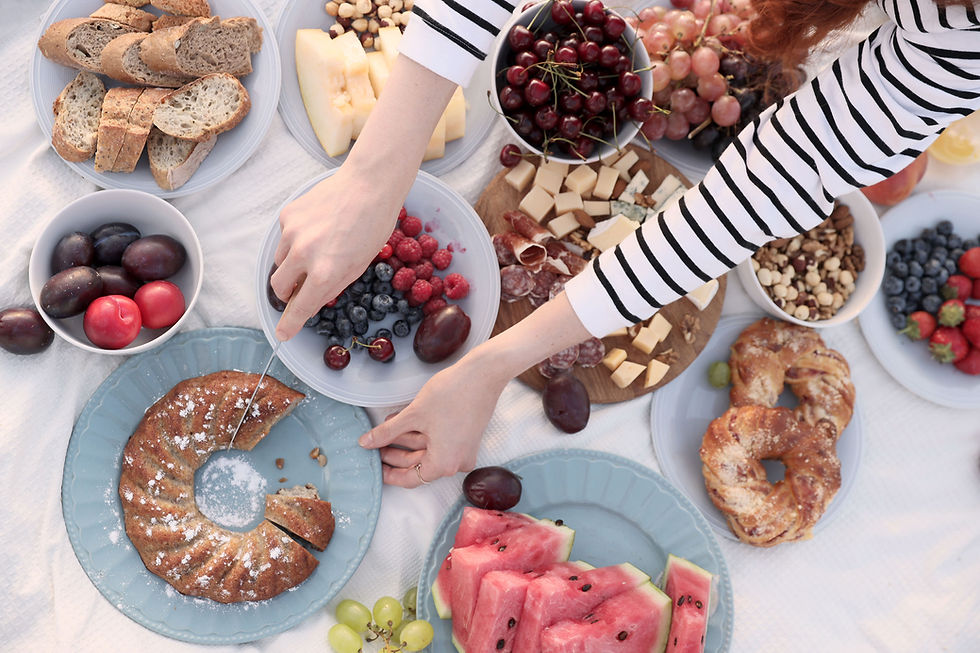The 'C' Word ....
- tracyrichards1

- Apr 1, 2024
- 4 min read

Now that I've got your attention, the 'C' word I'm referring to is calories and I'm living dangerously here and heading into controversial territory..the great calorie debate. There's a lot of talk out there claiming that calories don't count and this can be confusing particularly as for those of us who are children of the 70's and 80's, we were literally force fed the message that calories in and calories out was the key to weight loss success.
In the melting pot of advice out there, it's hard to know what to do and none of us have the time to read through all the research that supports all the conflicting information that's available to us. If we look at what the definition of a calorie is, it is a unit of energy and that energy is used by the body to function however, the question is do calories count? In my mind, the question should really be "in what way do calories count?"
There's no doubt that eating fewer calories than your body needs leads to weight loss, so in terms of losing weight it is important to consider the amount of calories that you consume. However, in terms of eating for good health, a low calorie diet doesn't necessarily mean it's a healthy one (and the same definitely goes for any packaged food that claims it's healthy because it's low calorie or low fat, more often than not, these low calorie/fat foods found in a packet are more unhealthy than a higher calorie version).
A calorie deficiet worked for me after trying no end of diets, where it would be fair to say I failed miserably, mostly due to an inability to sustain the various restrictions that some diets require. The thing to remember though is that the majority of the calories you consume should support you nutritionally and yet allow space for the things you love to eat (because who wants to live a life without eating a little chocolate, cake, chips ... add your own favourite here!).
It's as much about mindset as it is about what you put in your mouth, often we view a weight loss programme as being something that is about deprivation and restriction which isn't great for getting our head into the game. If the thought of counting calories and grams of protein, carbohydrate and fat fills you with dread then the following suggestions may just be what you need to get you started.
The concept of crowding-in is a good place to start and an easy one to adopt. The idea is that you eat the meals you would usually choose but you increase the volume of nutrient dense foods into those meals. This means adding more vegetables to your plate or having a side salad with your main meal or as a starter, you can also add beans or lentils to a casserole, bolognese or curry and reduce some of the meat that you would usually have in those recipes. This way, you don't feel deprived, you're eating foods you enjoy and you are improving the nutrient density of each meal. The addition of more fibrous foods will be filling and will also be good for keeping blood sugar levels stable. Stabilising blood sugar levels means that cravings are less likely to come and hit you hard leaving you reaching for the biscuit tin. Increasing the volume of nutrient dense lower calorie foods into our regular meals can mean the overall calorie count is lower but you've made the calories count in terms of their nutritional value.
Another way to do this is by using the rule of palm. To your plate, add a minimum of two palm sized amounts of non-starchy vegetables. The protein element should be the equivalent of one flat palm and the carbohydrate element, (this includes potatoes, rice, pasta, grains such as couscous, quinoa etc) should be the same ...another flat palm sized amount. By plating like this, you will quite possibly recognise that we can often overload our plates with some of the more calorie dense foods and ultimately over consuming can lead to weight gain. As with the crowding-in concept, you've increased the nutrient density of your meal but without restricting yourself.
Meal prepping and calorie tracking worked for me, knowing what I was going to eat over the course of the day before I'd even started breakfast helped me stay on track always leaving a little space for anything extra that might pop up...the offer of a glass of wine or a piece of chocolate shouldn't come with a side order of guilt and we should feel free to enjoy them as part of a healthy diet. When I started to track the food I ate in terms of their calorie content, I was shocked at how much food I was eating and most of it was considered to be healthy. I used to believe that if I ate unprocessed, cooked from scratch food that I wouldn't gain weight and yet I did. I realise that this goes against a lot of the nutrition advice out there right now but continuing to eat unprocessed, cooked from scratch food in smaller quantities meant that I lost weight (and I still included a few treats along the way).
If weight loss and healthy eating is your goal, give these a try...they may just help you to reach your goals without feeling like you're missing out on the foods you love.
Let me know in the comments if you give any of these ideas a try.




Comments